When rebellion broke out in the American colonies, British royals—including King George III and Lord Frederick North—moved quickly. Their actions would change the course of history.
-
Fall 2020 George Washington Prize
Volume65Issue8
Excerpted from the George Washington Book Prize winner The British Are Coming: The War for America, Lexington to Princeton, 1775-1777 (The Revolution Trilogy, 1), by Rick Atkinson (Henry Holt).
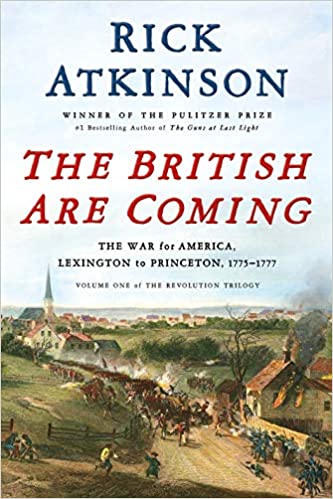
For more than two hundred years, the House of Commons had met in St. Stephen's Chapel, built within the palace of Westminster in the twelfth century for the monarch's private worship. Window glass depicted biblical stories. Peacock feathers and squirrels' tails had been used to paint angels on the walls and saints around the altar; white down plucked from the breasts of royal swans was daubed in paint to inflect the high blue ceiling with thousands of gold stars.
When Henry VIII shifted to a new palace at Whitehall, old choir stalls became members' benches, a Speaker's chair replaced the altar, whitewash covered the wall paintings, and the spangled ceiling was lowered to improve the acoustics. Architect Christopher Wren added galleries above the debating chamber, which was smaller than a tennis court. The hall retained an ecclesiastical air, even as parliamentarians cracked nuts, peeled oranges, or wandered out through the lobby for a game of whist and a glass of Madeira.
On January 19, when the Commons reconvened after the Christmas holiday, members as usual were packed like sprats in a tin. With a thud, a clerk dropped 149 documents on a central table, announced that they were "papers relating to the disturbances in North America," and in a somber tone began to read the titles of each: Royal Navy dispatches from American waters; seditious extracts from the Continental Congress; reports written by royal officials from New Hampshire to Georgia; official correspondence from London to colonial governors.
Slouched on the Treasury bench to the right of the Speaker's chair, a corpulent, round-shouldered figure listened as the recitation droned on, his eyelids so heavy that he appeared to be dozing. Thick-lipped, with both brow and chin receding, he was said to have a tongue "too large for his mouth" and "prominent eyes that rolled about to no purpose." No matter: Lord Frederick North, a man without vanity who referred to himself as "an old hulk," was always pleased to be underestimated.
In the first decade of George III's reign, six men held the office of prime minister, better known at the time as chief or first minister. They had little in common other than slender competency and an unsteady handling of Parliament. In 1770 the king turned to a childhood playmate--he and North had acted together in a schoolboy production of Joseph Addison's Cato--and a political partnership began that would endure through a dozen difficult years. George knew he had his man when he wrote North just a few months into his new chief minister's tenure, pleading for £13,000 in cash by day's end because of "a most private and delicate" need-the Duke of Cumberland had successfully sued the king's younger brother after catching him in flagrante delicto with his wife. North replied within hours that he had "no doubt of being able to procure the sum desired ... in such a manner to keep it as much out of sight as possible." George answered, "This takes a heavy load off of me."
Even his adversaries adored North, a man "of infinite wit and pleasantry," as one admitted. A diplomat added, "It was impossible to experience dullness in his Society." Now forty-two, the son of an earl, he was a gifted Greek and Latin scholar, adept in French, German, and Italian, with an adhesive memory, a youthful delight in the absurd, and "a temperament completely free from irascibility," as one admirer observed. A happy husband and a doting father to six children, he was generous, companionable, and honest. "He kept his hands clean and empty," a colleague wrote, while another noted, "What he did, he did without a mask." North held a constituency in Banbury with fewer than two dozen eligible voters, who routinely reelected him after being plied with punch and cheese, and who were then rewarded with a haunch of venison. Capable of reciting budget statistics for hours without consulting a note, he supervised national finance as head of the Treasury Board. Deft in debate, North was the principal defender of government policy in the Commons. In the past year he had delivered more than a hundred speeches on various measures, most of them harsh, relating to America. Many more such speeches lay ahead.
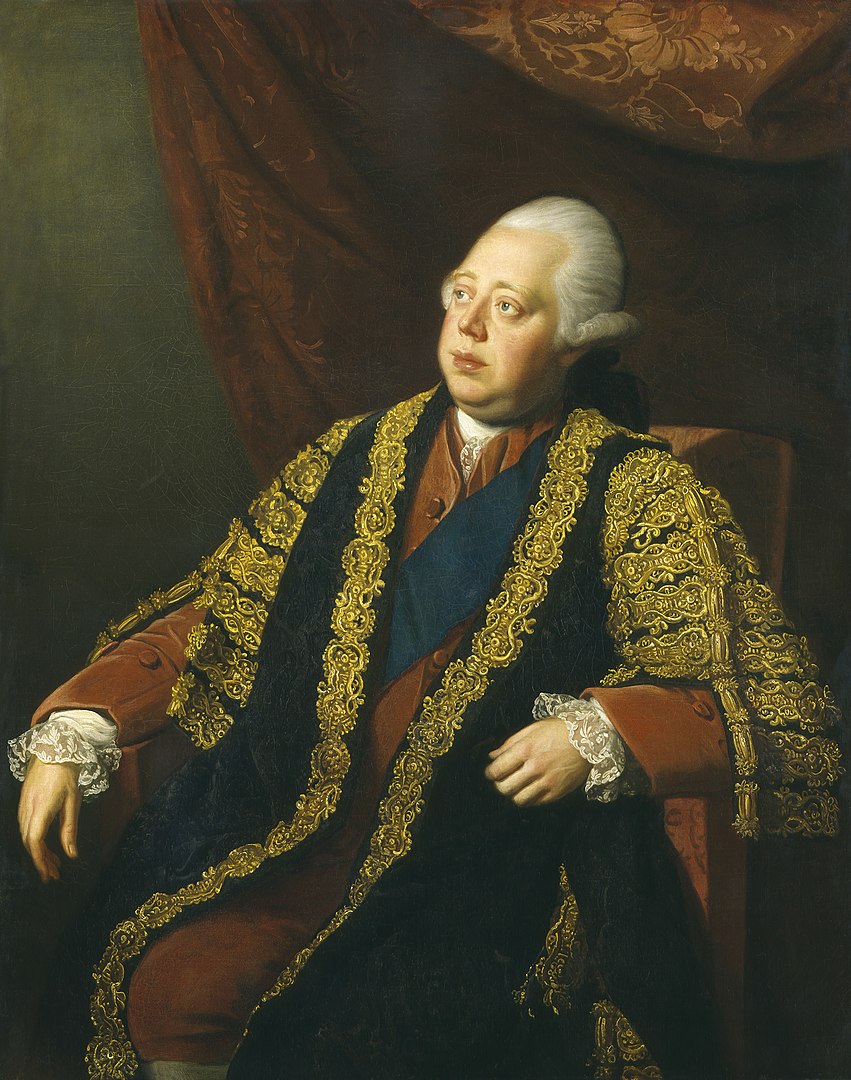
Ahead, too, lay calamity. By his own recent acknowledgment, North was "fond of indolence and a retired life." Averse to confrontation and an instinctive conciliator, he was given to melancholy and indecision. Now he was fated to be a war minister, with his king's empire in the balance. He could talk tough, as in his claim that "America must fear you before they will love you" or his assurance to the Commons that "four or five frigates" could close Boston Harbor because "the militia of Boston were no match for the force of this country." Yet colleagues sensed that his heart was not in it; he lacked, one said, the requisite" despotism and violence of temper." His confession that "upon military matters I speak ignorantly, and therefore without effect" revealed his ambivalence. Devoted to George, he would stay the course set by his monarch, a vessel for the king's obstinacy. A loyal friend though perhaps not a good one, he reinforced His Majesty's narrow attitudes rather than gently widening his vision. It was North, after all, who in 1770 had said, "I can never acquiesce in the absurd notion that all men are equal." Now, with his stack of 149 documents as proof of American perfidy, he would seek Parliament's agreement to force submission.
The first obstacle arose in the other chamber, the House of Lords, which met nearby in a medieval hall at the south end of the Westminster warren. On January 20, William Pitt, the Earl of Chatham, the venerable statesman and strategist who had engineered Britain's victory in the Seven Years' War, rose to his feet to denounce the government's folly and to demand withdrawal of British troops from Boston. "He seemed like an old Roman senator," a witness in the gallery reported, "rising with the dignity of age, yet speaking with the fire of youth." Chatham's long decline, physical and mental, was well advanced-he called himself "the scarecrow of violence"-but he knew his mind in urging reconciliation with the Americans. "All attempts to impose servitude upon such men, to establish despotism over such a mighty continental nation must be in vain," he warned. "We shall be forced, ultimately, to retract. Let us retract while we can, not when we must." France and Spain, he told the peers, "are watching your conduct, and waiting for the maturity of your errors." He continued: My lords, there is no time to be lost. Every moment is big with dangers .... The very first drop of blood will make a wound that will not easily be skinned over.
The old lion's eloquence changed few minds; his motion lost 68 to 18. Ten days later, Chatham would try again with a proposal to designate Congress as a lawful entity and to suspend the Coercive Acts, with complete repeal to follow upon American acknowledgment of Parliament's authority. Once again a heavy majority defeated the bill. Chatham wrote his wife that the government seemed "violent beyond expectation, almost to madness."
To Lord North's satisfaction, the House of Commons proved no less bellicose. American insurgents were "an enemy in the bowels of the kingdom," one member insisted. Another who had seen military service in America during the last war assured his colleagues that five thousand British regulars could march through the colonies unhindered; Americans, "of a pusillanimous disposition, and utterly incapable of any sort of order or discipline," would "never dare to face an English army." It helped the government's cause that roughly a hundred members of the Commons were past or current military officers, reliably loyal. It also helped that North had spent £50,000 from a Treasury slush fund in the 1774 election to buy a couple dozen seats for other pliant candidates. Further, the king had purchased additional loyalty by sprinkling lucrative sinecures and patronage appointments among members of both houses, including eleven grooms of the bedchamber, a master of the jewel office, a master falconer, an usher of the exchequer, rangers of the royal forests, seven equerries, and various masters of the harriers, buckhounds, and staghounds. "This Parliament," observed the writer Horace Walpole, the son of a former prime minister, "appeared to be even more corrupt and servile than the two last."
At two-thirty a.m. on February 7, the Commons by a vote of 288 to 105 supported North's proposal to ask the king to declare Massachusetts in rebellion, and to take all measures needed to bring American insurgents to heel. "If they would submit and leave us the constitutional right of supremacy," North said, "the quarrel would be at an end." The Lords followed suit, 104 to 29, at one-forty a.m. the following morning.
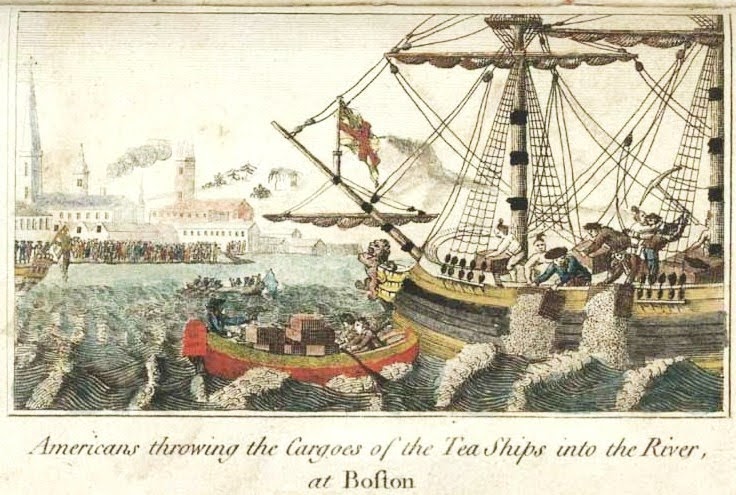
Among new members voting with the Commons majority was an elfin man with a double chin and a squat nose who in his study on Bentinck Street was writing a great saga, the first volume of which would soon be published as The History of the Decline and Fall of the Roman Empire. Few parliamentarians would be as steadfast for the Crown as Edward Gibbon. "We have both the right and the power on our side," he had told a friend a week earlier. "We are now arrived at the decisive moment of preserving, or of losing forever, both our trade and empire." Yet few would be as reflective, as when he later conceded, "I took my seat at the beginning of the memorable contest between Great Britain and America, and supported with many a sincere and silent vote, the rights, though not perhaps the interest, of the mother country." For now, a few hours after casting his vote, Gibbon wrote, "With firmness, all may go well. Yet I sometimes doubt."
The king had no doubts. Parliament's resolve "ought to open the eyes of the deluded Americans," he wrote North on the morning of Wednesday, February 8. "But if it does not, it must set every delicate man at liberty to avow the propriety of the most coercive measures." Beyond majority votes in both houses, George wanted a theatrical, public display of support. A few hours later, he again wrote North to propose "a large attendance" at St. James's the next day. Hundreds from the Commons and the Lords were to make the short journey to the palace, as a group, to demonstrate unity. "I therefore hope," he added, "you will insinuate the propriety of this."
Shortly before three p.m. on Thursday, braving a blustery wind from the southwest, Parliament picked a path through the willows and poplars of St. James's Park to the red brick octagonal towers of that "irregular pile," as one critic described the palace. The London Gazette would report that "there never was known so many of the bishops and peers to attend an address to His Majesty .... There was also the greatest number of commoners ever known on a like occasion." Not far from the hearth inscribed with the initials of Henry VIII and his doomed queen Anne Boleyn, the king listened as Parliament's petition was read aloud: "We find that a part of your Majesty's subjects in the province of the Massachusetts Bay have proceeded so far to resist the authority of the supreme legislature, that a rebellion at this time actually exists .... We consider it as our indispensable duty, humbly to beseech your Majesty that you will take the most effectual measures to enforce due obedience to the laws and authority of the supreme legislature."
George was nearsighted, and some faces around the room were blurry as he read his brief reply, composed with North's help: "You may depend on my taking the most speedy and effectual measures for enforcing due obedience to the laws .... It is my ardent wish that this disposition may have a happy effect on the temper and conduct of my subjects in America."
Events now moved swiftly. That very day the king ordered several regiments in Ireland to prepare for "foreign service." On Friday, North introduced another bill, this one to prevent all New England colonies from trading with any foreign nations and to exclude them from the world's richest fishing grounds, in the North Atlantic. That measure would again muster large majorities. A few days later, Parliament approved hiring another two thousand sailors for the navy; the government also requested money for an extra 4,400 soldiers, with the intention of expanding the army in America to almost 11,000. In recent weeks, the king had considered ousting the military commander there, Lieutenant General Thomas Gage, on suspicion of insufficient grit; instead he chose to send three young major generals to stiffen Gage's spine. He told North to give each an extra £500 before they sailed--"they have behaved so very properly and are so poor." Whatever Gage's shortcomings, North knew that nearly all of the forty-five generals senior to him, some in their eighties, lacked the vigor, the experience, or the bloody-mindedness to take command in Boston. "I do not know whether our generals will frighten the enemy," he supposedly quipped, "but I know that they frighten me."
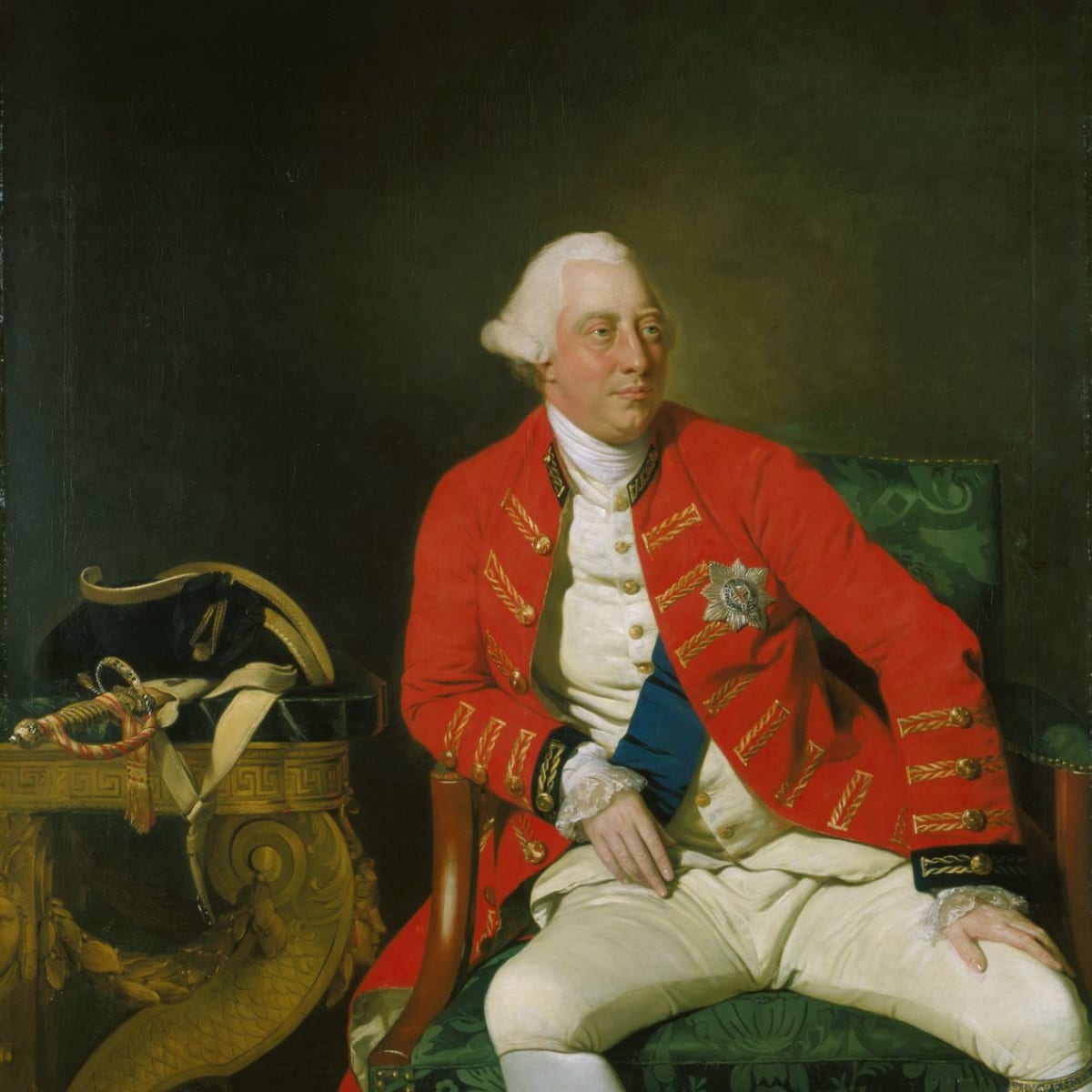
Still, the king felt sure of his course. To North he wrote on February 15, at precisely 10:06 a.m.: "I entirely place my security in the protection of the Divine Disposer of All Things, and shall never look to the right or left but steadily pursue the track which my conscience dictates to be the right one."
For more than three centuries, the Tower of London had issued departing armies the ordnance needed to fight Britain's expeditionary battles, from field guns and shoulder arms to bullet molds, powder flasks, and musket flints. In the early spring of 1775, the place grew busy again. "Many thousand firearms sent out of the Tower and shipped on board the transports," a visiting American artist wrote. "Kegs of flints marked 'Boston' on each keg, with all the implements of war."
A Tower armory reportedly held eighty thousand stand of arms, "bright and shining." Visitors could pay four pence to view the "Royal Train of Artillery," from 6-pounders to 24-pounders, some with new leveling screws for quicker aim and greater accuracy. The train also included 11-inch mortars and "carcass" shells packed with combustibles designed to incinerate enemy towns. New brass cannons filled an adjacent storehouse more than a hundred yards long, with sponges, rammers, handspikes, drag ropes, and other gunnery tools, plus four thousand harnesses for pull teams. Obsolete weapons decorated Tower walls in fantastic sculptures, like the seven-headed hydra constructed from old pistols. Stacked bayonets and ancient firelocks formed a corkscrew pillar twenty-two feet high.
The place was a tabernacle of firepower. Gun shops clustered along the Thames below the Tower walls assembled the flintlock musket known as the Brown Bess. Smiths fitted the barrels and locks, mostly forged in the Midlands from imported Swedish iron, to walnut stocks; they then attached the "furniture"-brass and iron mounts, including triggers and butt plates. Each musket cost one pound, thirteen shillings, plus four pence to prove the barrel and fit a bayonet. Tower officials also tested the potency of gunpowder made in government and private mills. The British appetite for powder was voracious: each foot regiment typically received 42,000 powder charges a year, enough for every soldier to fire 60 to 120 lead balls. That allotment would increase in heavy combat. A single warship of 100 guns might carry 535 barrels, nearly 27 tons; even a small naval sloop could carry 6 tons, more powder than would be found in all the rebel magazines around Boston a few months hence. "Incredible quantities of ammunition and stores shipped and shipping from Tower Wharf for America," another correspondent reported.
Precisely how this formidable strength should be wielded against America remained in dispute among the king's men. "A conquest by land is unnecessary," the secretary at war, Lord William Barrington, had advised in December, "when the country can be reduced first to distress, and then to obedience, by our marine." That marine--the Royal Navy--might have its own woes, but General Edward Harvey, the adjutant general and the highest army official in Britain, agreed that "attempting to conquer America internally with our land force is as evil an idea as ever controverted common sense." He added bluntly: "It is impossible."
The army's small size fueled this consternation. In 1760, at the height of the Seven Years' War, Britain had mustered more than 200,000 men, including mercenaries. Now the army's paper strength had dipped below 50,000--less than a third the size of France's army--and no more than 36,000 soldiers actually filled the ranks, of whom thousands kept the restive Irish in check. Recruiting was difficult, and although many of the army's 3,500 officers had combat experience, the force had fought few major battles since Quebec and Minden, sixteen years earlier. A few prominent commanders refused to fight the Americans, among them Sir Jeffrey Amherst, who had led North American forces against the French from 1758 to 1763. While some junior officers were keen to earn their spurs in New England, enough were leaving the service that in February the king declared he would "not listen to any further requests" from those hoping to sell their commissions rather than embark for America; he deemed such behavior a "great impropriety."
Lord North, as early as September 1774, had suggested that "Hessians and Hanoverians could be employed if necessary." During the winter, secret negotiations had begun in Kassel to retain German hirelings, should war erupt in America.
A fateful momentum swept the government along. Something must be done; even those wary of war agreed that American rebellion could not be condoned. Much of the particular planning fell to slender, rigorous William Legge, the Earl of Dartmouth and the colonial secretary, who was so pious a Christian that he was known as the "Psalm Singer"; his country home near Birmingham had provided a refuge for evangelical preachers and for revival meetings of sobbing, hysterical worshippers. Raised in the same household as North, his stepbrother, Lord Dartmouth was hardly a warmonger. But he believed that prideful rebels disobeyed both their British masters and their God. Obedience and Christ's redemption were needed to set things right, along with a few regiments. After a decade of fitful, indecisive political skirmishing, a short, sharp contest of arms offered an appealing clarity.
And so war stuffs spilled from the Tower and other depots to be loaded onto westbound ships: canteens, leather cartridge boxes, watch coats, tents, five-ton wagons by the dozen, muskets by the hundreds, powder by the ton. There was a run on New World maps, although one London skeptic later wrote, "The small scale of our maps deceived us, and as the word 'America' takes up no more room than the word 'Yorkshire,' we seemed to think the territories they represent are much the same bigness, though Charleston is as far from Boston as London from Venice."
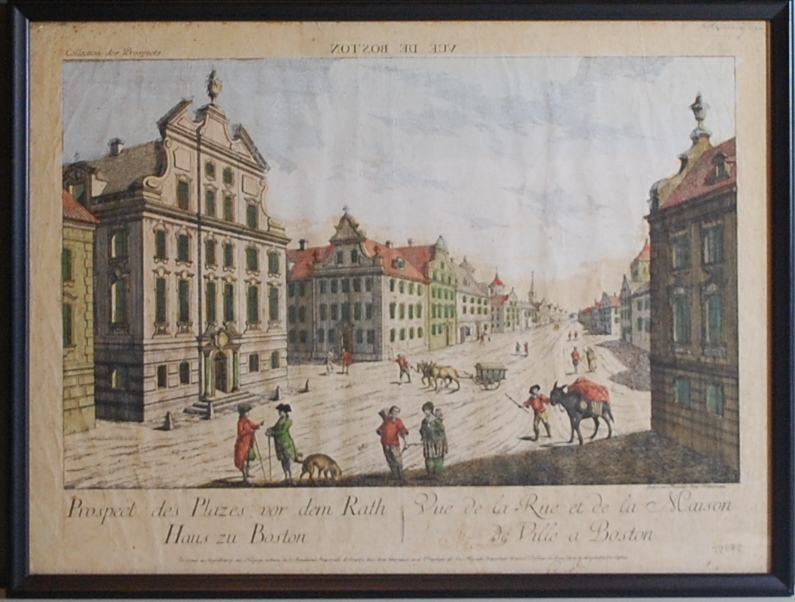
Troops tramped toward the ports. A London newspaper reported that a light cavalry regiment preparing to deploy had inscribed "DEATH OR GLORY" on its caps, with an embroidered skull. Seven regiments of foot bound for America were brought to strength by drafting soldiers from units left behind. Each regiment was also permitted to take sixty women, twelve servants, and eighty-six tons of baggage. On the southern coast of Ireland, Cork grew so crowded that officers waiting to embark on transport ships complained of difficulty in finding lodging. Soldiers living in hovels on Blarney Lane or Brogue Market Street practiced the manual of arms, though some lacked muskets. Each would be issued a bunk, a bolster, a blanket, and a spoon for the voyage. The usual drunken sprees and fistfights between soldiers and sailors kept officers alert; dragoons preparing to sail from Cork found the ships' holds stacked with so many casks of porter being smuggled for sale in Boston that they could not reach the stalls to feed their horses.
As the squadrons awaited a fair wind, a vague unease drifted through the kingdom. "Our stake is deep," wrote Horace Walpole. "It is that kind of war in which even victory may ruin us." But the man who reigned over that kingdom remained constant, as ever. "When once these rebels have felt a smart blow," George told his Admiralty, "they will submit." Blows would decide, as the king had predicted. Yet no one could foresee that the American War of Independence would last 3,059 days. Or that the struggle would be marked by more than 1,300 actions, mostly small and bloody, with a few large and bloody, plus 241 naval engagements in a theater initially bounded by the Atlantic seaboard, the St. Lawrence and Mississippi Rivers, and the Gulf of Mexico, before expanding to other lands and other waters.
Roughly a quarter million Americans would serve the cause in some military capacity. At least one in ten of them would die for that cause--25,674 deaths by one tally, as many as 35,800 by another. Those deaths were divided with rough parity among battle, disease, and British prisons, a larger proportion of the American population to perish in any conflict other than the Civil War. If many considered the war providential-ordained by God's will and shaped by divine grace-certainly the outcome would also be determined by gutful soldiering, endurance, hard decisions (good and bad), and luck (good and bad).
The odds were heavily stacked against the Americans: no colonial rebellion had ever succeeded in casting off imperial shackles. But, as Voltaire had observed, history is filled with the sound of silken slippers going downstairs and wooden shoes coming up.
This would not be a war between regimes or dynasties, fought for territory or the usual commercial advantages. Instead, what became known as the American Revolution was an improvised struggle between two peoples of a common heritage, now sundered by divergent values and conflicting visions of a world to come. Unlike most European wars of the eighteenth century, this one would not be fought by professional armies on flat, open terrain with reasonable roads, in daylight and good weather. And though it was fought in the age of reason, infused with Enlightenment ideals, this war, this civil war, would spiral into savagery, with sanguinary cruelty, casual killing, and atrocity.

